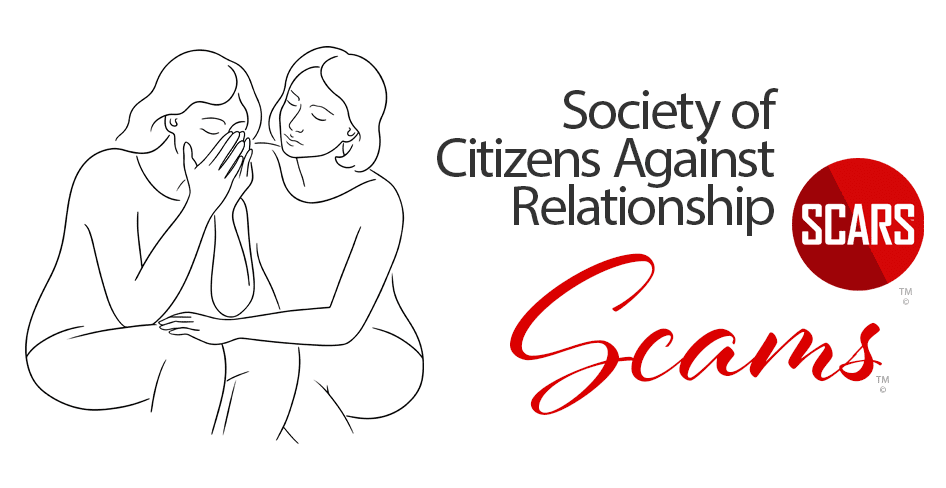Romance Scams & Frauds Standard Approved Terms
 Romance Scams & Frauds Terminology – General Definitions
Romance Scams & Frauds Terminology – General Definitions
The following have been defined by the Committee on Ethics in Scam Reporting and adopted by SCARS
These are general definitions relating to online and email fraud:
- 419: or the Nigeria scam gives the impression you can gain a large amount of money and only requires bank information to deposit the money into your account. “419” Refers to the law governing this criminal activity in Nigeria.
- BEC: For the purpose of this standard, a “BEC” is a Business Email Compromise fraud.
- DECEPTION: is the act of causing one to believe information that is not true or an untruth or not the whole truth. The U.S. Federal Trade Commission will find an act or practice deceptive if there is a misrepresentation, omission, or other practice that misleads the consumer acting reasonably in the circumstances, to the consumer’s detriment.
- CATFISH / CATFISHING: a Fraudster creates a fake online profile with the intention of deceiving someone.
- MONEY LAUNDERING: the concealment, knowingly or unknowingly, of the origins of illegally obtained money, typically by means of transfers involving foreign banks or legitimate businesses.
- PHISHING: an Online fraud performed by email, on a website, application, or via other communications, where the Victim provides identity and/or financial information to the Fraudster, where the Victim believes they are providing it for legitimate purposes.
- RUMBLE: is the Recruitment of Unwitting Money Launderers (by Bogus Letters of Employment) by fraudulent means.
- SCAM: a scam is a term used to describe any fraudulent business or scheme that takes money or other goods from an unsuspecting person. With the world becoming more connected thanks to the Internet, online scams have increased, and it’s often up to individuals to help stay cautious with unknown people on the Internet. For the purposes of this standard, we will use the definitions contained here.
- SCAMWARE: a type of malware that displays on-screen warnings of nonexistent computer infections or generates constant pop-ups intended to trick someone into buying useless or potentially dangerous “protection” software.
- SMISHING: named for the SMS (Short Message Service) technology used to send text messages via mobile phones, it means phishing attempts made on cellphones.
- STOLEN CONTENT: are photos and other elements (Graphics, Text, Factual or Biographical Data, and other Information) that are taken without authorization form an individual by the Fraudster for the purpose of performing on Online Fraud.
- VISHING: short for “Voice Phishing,” it’s the use of recorded messages to telephones — usually claiming to be from a bank — with the goal of tricking someone into revealing personal or account information for identity theft.
Ethical Standard Definitions & Official Terms
For the purposes of this standard, the following terms will be standardized and used – they are being standardized to also allow for more accurate foreign language translations:
- ACCOMPLICE: an Accomplice is a willing participant in the Fraudster’s Online Fraud or Email Fraud performing any function, including receiving monies or Money Laundering.
- ANTI-SCAM GROUP: an individual or group of individuals that have no legal status that has been formed and engages in one or more activities to aid consumers avoid Online Fraud or Recover from its effects.
- ANTI-SCAM ORGANIZATION: a business or other legally registered entity that engages in one or more activities to aid consumers avoid Online Fraud or Recover from its effects.
- EMAIL SCAM: the following terms are deemed to be equivalent and of the same meaning: Scam, Fraud, Con, Con-job, Deception, Fakery, Deceit, Hoax, Racket, Rip-off, Sham, Cheat, Cheating, Flimflam, Hosing, Hustle, Sting, Con Game, Crooked Deal, Dirty Pool, Double-cross, Fast-one, Shady Deal, Shell Game, Snow Job, Sucker Game, 419 Scam, 419 Fraud, 419 – prefaced with email or electronic mail. Online Fraud will be the term universally used for these purposes.
- FAKE FRAUDSTER: a Fake Fraudster is someone where one or more of the identity elements are stolen from a real person (Impersonation) or are Fake, False, Invented, or Fabricated.
- FRAUDSTER: the following terms are deemed to be equivalent and of the same meaning: Scammer, Fraudster, Con-artist, Bunko-artist, Defrauder, Faker, Scam-rat, Love-rat. Fraudster will be the term universally used for these purposes.
- FRAUDSTER DATA: is all of the information relating to a Fraudster. This includes: Name(s), Address(s), Money Transfer information, Banking information, Profile Content, Messages, Emails, Photos & Images, and all other information specifically relating to the Fraudster.
- FRAUDSTER SCREENING: is the continuous action of reviewing audiences, viewers, members, or others for intrusion or participation of Fraudsters.
- GANG: a Gang is an organized criminal group of Fraudsters, either in one or many geographic regions.
- IMPERSONATION VICTIM: is someone who has had their photos or identity elements stolen by the Fraudster.
- IMPERSONATOR: an Impersonator is someone who uses one or more of the identity elements of a real person, specifically including the real name of a person, with the intent to confuse a victim into believing they are that person. Spoofing is the same as Impersonation.
- MULE: a Mule is an unwitting (unknowing) participant in the Fraudster’s Online Fraud or Email Fraud, either to receive and forward funds or for other purposes.
- ONLINE FRAUD: the following terms are deemed to be equivalent and of the same meaning: Scam, Fraud, Con, Con-job, Deception, Fakery, Deceit, Hoax, Racket, Rip-off, Sham, Cheat, Cheating, Flimflam, Hosing, Hustle, Sting, Con Game, Crooked Deal, Dirty Pool, Double-cross, Dast-one, Shady Deal, Shell Game, Snow Job, Sucker Game – prefaced with Online, Internet, Net, or Web. Online Fraud will be the term universally used for these purposes.
- PRIMARY VICTIM: is the actual Victim of an Online Fraud who has been defrauded by the Fraudster.
- REAL FRAUDSTER: a Real Fraudster is someone who uses or provides their real identity for the commission of an Online Fraud.
- ROMANCE SCAM: the following terms are deemed to be equivalent and of the same meaning: Scam, Fraud, Con, Con-job, Deception, Fakery, Deceit, Hoax, Racket, Rip-off, Sham, Cheat, Cheating, Flimflam, Hosing, Hustle, Sting, Con Game, Crooked Deal, Dirty Pool, Double-cross, Dast-one, Shady Deal, Shell Game, Snow Job, Sucker Game – prefaced with Romance, Dating, Sweetheart, Romantic, Love, Lust, Relationship, Matchmaking, or Matchmaker. Romance Scam will be the term universally used for these purposes.
- SECONDARY VICTIM: are persons not directly involved in the transaction between the Primary Victim and the Fraudster. These include: Mules unknowingly participating in the Online Fraud, Impersonation Victims who have had their photos or identity elements stolen by the Fraudster, family members of the Impersonation Victim that may be displayed in photos stolen by the Fraudster, and other persons who are either emotionally or financially harmed by the Fraudster.
- VICTIM: a Victim is a person who suffers emotional or psychological damage and/or loss of money and/or goods, as a result of an Online Fraud.
The above document is Copyright © 2016 Ethical Scam Reporting Project Committee Members – All Rights Reserved Worldwide – Licensed to SCARS.
Revision History:
2016 07 06 added revision history log, added term Fraudster Screening
![]()
Adopted by the Certification & Accreditation Committee, Society of Citizens Against Relationship Scams July 15, 2016
For additional Scamming Terms & Definitions please visit our Facebook Page of Scam Terms or www.RomanceScamsNow.com

